
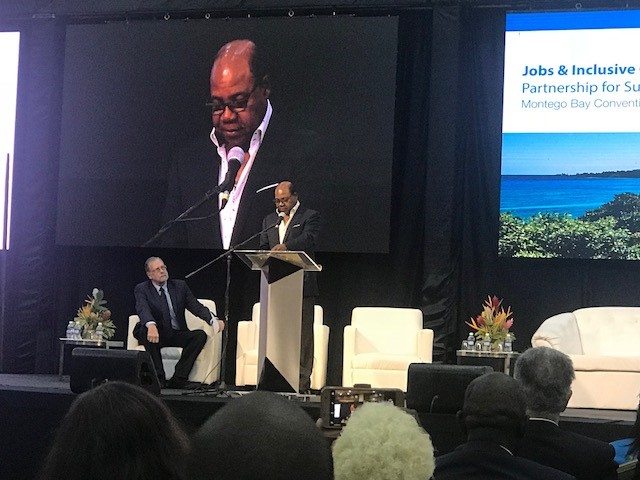
Jamaica UNWTO conference: The future of tourism in the Caribbean
Partnership for sustainable tourism started today at the UNWTO conference on jobs & inclusive growth in Montego Bay Convention Center.
A proud host the Jamaica minister of Tourism HE Edward Bartlett welcomed 1300 delegates from well over 60 countries to the largest tourism conference ever held in Jamaica. He said it’s actually the largest conference of this sort ever held in the world.
The subject this morning was the future of tourism in the Caribbean touching public private partnerships.
Keynote for The Future of Tourism – Innovation Challenges in the Caribbean Region was delivered by Eduardo Fayos-Solá, Senior Adviser, IITS George Washington University.
Overview session was moderated by Lloyd Waller, Senior Advisor to the Minister of Tourism, Ministry of Tourism, Jamaica.
The session’s panel members were:
• Dionisio D’Aguliar, Minister of Tourism and Aviation for the Bahamas and Chairman, CTO
• Karolin Troubetzkoy, President, CHTA
• Kim Hurtault-Osborne, Executive Secretary for Integral Development, OAS
• Virginia Messina, Director, Caribbean Recovery Taskforce, WTTC
• Carlos Vogeler, Executive Director, UNWTO
• Abel Matutes, Director General, Palladium Hotel Group
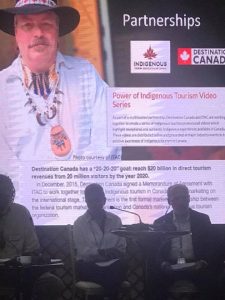
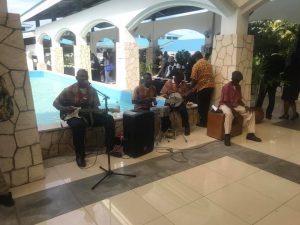
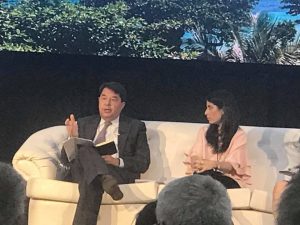
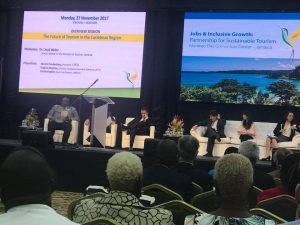
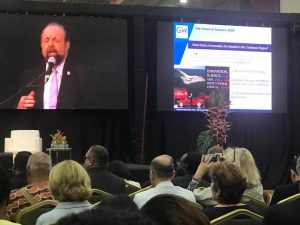
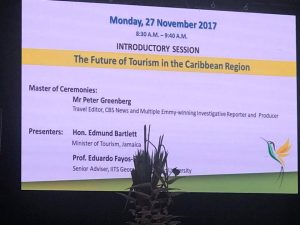
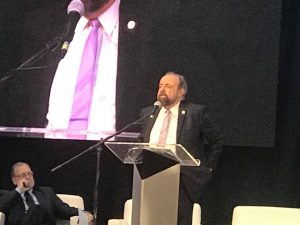
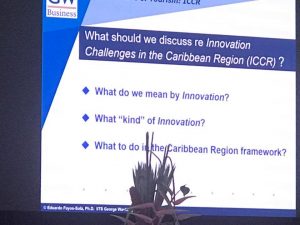
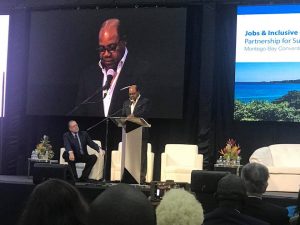
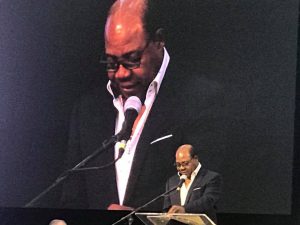
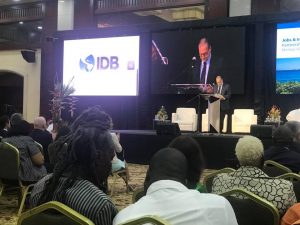
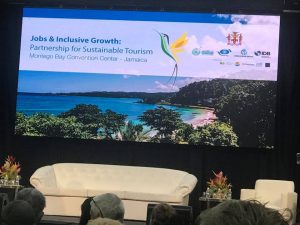
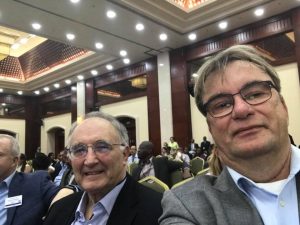
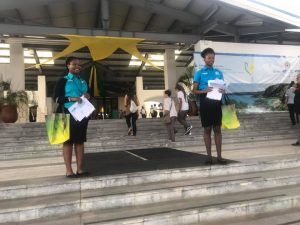
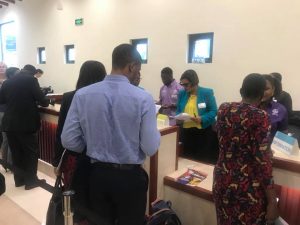
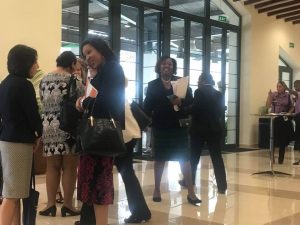
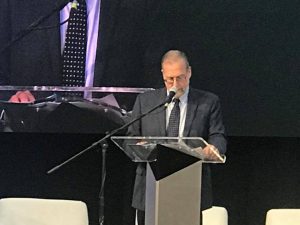
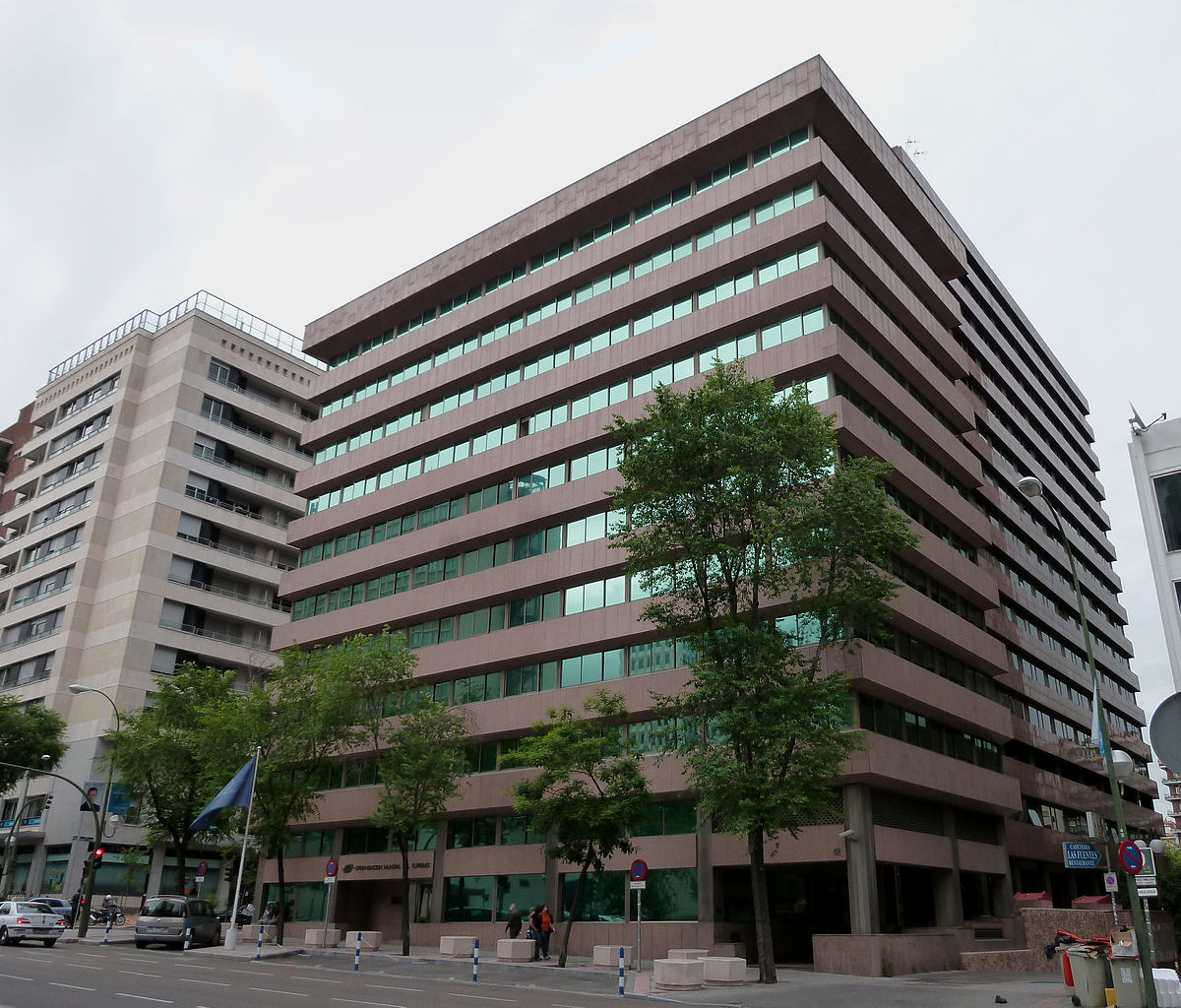
UNWTO announces the winners and finalists of the UNWTO Awards
The World Tourism Organization (UNWTO) announces the winners of the UNWTO Ulysses Prize and the UNWTO Ethics Award, as well as 14 finalists for the upcoming 14th Edition of the UNWTO Awards for Innovation in Tourism. The Awards Ceremony will be held next January 2018 in Madrid on the occasion of the International Tourism Fair, FITUR.
The UNWTO Awards recognize inspirational individuals and projects for their innovative achievement as well as their invaluable dedication to developing and advocating sustainable tourism in line with the UNWTO Global Code of Ethics for Tourism and the Sustainable Development Goals (SDGs).
The 14th Edition of the UNWTO Awards will take place in January 2018, co-hosted by FITUR, the International Tourism Fair in Spain/IFEMA in Madrid, Spain. The Awards Ceremony will be preceded by the UNWTO Awards Forum where finalists will present their respective projects.
The following are the awarded projects and individuals:
UNWTO Ulysses Prize for Excellence in the Creation and Dissemination of Knowledge in Tourism awarded to Valene L Smith.
Valene L. Smith, Professor Emeritus and Research Professor at the California State University, Chico, California, United States of America has been nominated as the 2018 UNWTO Ulysses prize laureate.
Professor Smith is a pioneer in tourism and anthropology, with an extensive number of projects and accomplishments throughout her extensive career. Her classic book, ‘Hosts and Guests’ (University of Pennsylvania Press, 1977), preceded by her 1953 geography courses, marked the start of this connection becoming explored by an army of scholars. She was recognized in 2000 as a Women of the 20th Century, and is a recipient of the US Chamber of Commerce’s Community Service Award. She is also an active member of various associations including the American Anthropological Association, the Society of Woman Geographers, the American Association of University Women and the American Fulbright Association.
UNWTO Ethics Award recognizes Europa Mundo Vacaciones
The Jury of the UNWTO Ethics Award, comprising Members of the World Committee on Tourism Ethics, has selected Europa Mundo Vacaciones as the winner of this second edition of the Award for its initiative “Europa Mundo Foundation”.
Europa Mundo Vacaciones is a Spanish tour operator strongly committed to the principles of environmental and social responsibility and has achieved remarkable results in the implementation of the UNWTO Global Code of Ethics for Tourism, particularly in its contribution to community well-being and sustainable development of tourism.
In 2011 it created a Foundation aimed at conducting social activities and development cooperation in different areas and for specific segments of the population, as well as to promoting sustainable tourism in many countries of Africa, Asia, Europe and Latin America.
The UNWTO Ethics Award was established in 2016 and is open to all companies and associations that are official signatories of the Private Sector Commitment to the UNWTO Global Code of Ethics for Tourism . To be eligible for the Ethics Award, signatories must have reported on its implementation.
14 Project finalists of the UNWTO Awards for Innovation in Tourism
Fourteen innovative projects among 128 applicants from 55 countries have been selected as finalists of the 14th UNWTO Awards for Innovation in Tourism. The winners will be unveiled during the UNWTO Awards Ceremony.
The list provided below is based on the alphabetical order of the country.
UNWTO Award for Innovation in Public Policy and Governance
- MiBarrio – Mercado de Hacienda Applied Research Project, Ente de Turismo del Ministerio de Modernización, Innovación y Tecnología del Ciudad Autónoma de Buenos Aires, Argentina
- Longmen Grottoes “Internet + Longmen” action plan, Management Committee of Longmen Grottoes World Cultural Heritage Park, China
- Tourism training talent (TTT), Turismo de Portugal, Portugal
UNWTO Award for Innovation in Enterprises
- Great Plains Conservation: Conserving and Expanding Natural Habitats, Great Plains Conservation and the Great Plains Conservation Foundation, Botswana and Kenya
- Conservation and Livelihoods: Community managed Ecotourism at Mangalajodi, Mangalajodi Ecotourism Trust, India
- Community and Resilience: two villages tackle depopulation, Valle dei Cavalieri, Italy
- Three-Pillar Innovation Initiative, Balesin Island Club, Philippines
UNWTO Award for Innovation in Non-Governmental Organizations
- Educating and empowering local communities for sustainable tourism futures, The Sumba Hospitality Foundation, Indonesia
- Connecting community, local friends, and visitors to a unique experience and happiness, Triponyu.com, Indonesia
- IT.A.CÀ – Migrants and Travelers, Festival of Responsible Tourism, Associazione YODA, Italy
- Strengthening Community Tourism in the Sierra Gorda, Grupo Ecologico Sierra Gorda, Mexico
UNWTO Award for Innovation in Research and Technology
- EarthCheck Building Planning and Design Standard (BPDS), EarthCheck, Australia
- eVisitor – Croatian national tourist information system, Croatian National Tourism Board, Croatia
- Smart Tourism System (STS), SEGITTUR, Spain
Further information:
- 14th UNWTO Awards Forum, 15 January 2018, Paraninfo, Complutense University of Madrid, Madrid, Spain.
- 14th UNWTO Awards Ceremony, 17 January 2018 at IFEMA, Madrid, Spain.
Useful links:
- 14th UNWTO Awards Events
- Sponsorship opportunities
- Register for the events: the registration will open early December.
- More information on the winners and finalists:

ETC and UNWTO discuss transnational themes and routes in Galicia
The European Travel Commission (ETC) and the World Tourism Organization (UNWTO) held an international seminar in Santiago de Compostela to exchange best practices on how to develop and effectively manage transnational tourism themes and routes. The ETC-UNWTO International Seminar on Marketing Transnational Tourism Themes and Routes was hosted by the Xunta de Galicia and Turespaña on 16-17 November 2017 in the emblematic city of Santiago de Compostela, final destination of the thousand-year-old pilgrim route the Way of St. James.
The two-day event provided insights into the development, management and promotion of transnational tourism themes and routes in Europe and worldwide, as well as practical guidance for National Tourism Organization (NTOs), Destination Management Organizations (DMOs) and National Tourism Administrations (NTAs) on how to market and promote destinations through transnational thematic tourism experiences and products.
“Destinations are at their best when they can benefit from shared experiences and best-practice examples” said UNWTO Executive Director Zhu Shanzhong. In this regard, “collaboration and cooperation among all stakeholders involved are vital to ensure the success of transnational initiatives”, he added.
The international seminar drew the participation of European NTOs, DMOs and travel trade entities, as well as representatives from the European Commission (EC), the European Parliament (EP), the United Nations Educational, Scientific and Cultural Organization (UNESCO), the European Tourism Association (ETOA) and the European Institute of Cultural Routes (EICR), among others.
The event was the occasion to launch the new ETC-UNWTO Handbook on Transnational Tourism Themes and Routes, which provides step-by-step guidance on how to achieve successful themed transnational tourism.
“ETC and UNWTO acknowledge the importance of transnational collaboration in tourism as the competition is becoming increasingly regional rather than national. Today, with the launch of the Handbook on Marketing Transnational Tourism Themes and Routes, we seek to support the work of tourism authorities, managers and experts in this direction” said ETC President Peter de Wilde.
“Europe is much more than its main iconic spots and therefore we should develop transnational policies that help us attract visitors to other destinations”, argued Nava Castro, Director of Tourism of Galicia. Castro referred to the Camino de Santiago and its recognition as the First European Cultural Itinerary and its cultural and spiritual dimensions worldwide. As highlighted, the Camino has become an international reference as it has welcome over 300,000 pilgrims on foot, by bicycle or on horseback of up to 179 different nationalities only in 2017. Only 3,000 visitors were doing the Camino three decades ago.
At the closing of the seminar, the President of Galicia Alberto Nuñez Feijóo reiterated the commitment of Galicia to a responsible, sustainable and accessible tourism, in the framework of the International Year of Sustainable Tourism for Development.

Buenos Aires accounts for over half of Argentina´s tourism
Buenos Aires generates over a half of Argentina´s Travel & Tourism GDP, revealed a new report by the World Travel & Tourism Council (WTTC), Latin America City Travel & Tourism Impact.
Latin America City Travel & Tourism Impact is one of a series of reports by WTTC which looks at the contribution of Travel & Tourism to city economies and job creation. The study covers 65 cities, six of which are in Latin America.
The city’s Travel & Tourism sector accounts for 5.1% of its overall economy and totals US$11.1bn. The sector employs 265,000 people in Buenos Aires, or 3.8% of the city´s workforce. Over a half of Argentina’s tourism GDP (59.1%) is in Buenos Aires, and the city is responsible for 46.3% of jobs in the sector in Argentina.
Buenos Aires has a high reliance on domestic tourism, even though the weak Argentinian peso has made the destination more affordable for foreign visitors in recent years. Overall domestic visitors account for 61% of Buenos Aires’ Travel & Tourism. Over the past decade, the number of overnight visits has more than doubled although this has mainly been driven by the domestic market as improved affordability has not yet been sufficient to attract large volumes of additional international visitors.
Slow international growth can partly be explained by the fact that Brazil, which is Buenos Aires’s top international market, has been suffering a recession in recent years.
International spend is responsible for 14.6% of Buenos Aires’ Travel & Tourism sector. The Argentinian government’s introduction last January of a scheme to allow international visitors to receive a refund of VAT on accommodation, should help to increase international spend in the future.
The total contribution of Argentina´s Travel & Tourism to GDP was ARS775.3bn (US$52.5bn), 9.6% of GDP in 2016. The total contribution of Travel & Tourism to employment, including jobs indirectly supported by the industry was 8.8% (1.58 million jobs). Over the next ten years, 400,000 new jobs will be generated through Travel & Tourism in Argentina. Buenos Aires will host WTTC´s annual Global Summit 18-19 April 2018. The Summit brings together over 900 delegates to discuss the opportunities, challenges and issues facing the industry, while its Tourism for Tomorrow Awards recognise the industry’s power to be a positive force in sustainability.
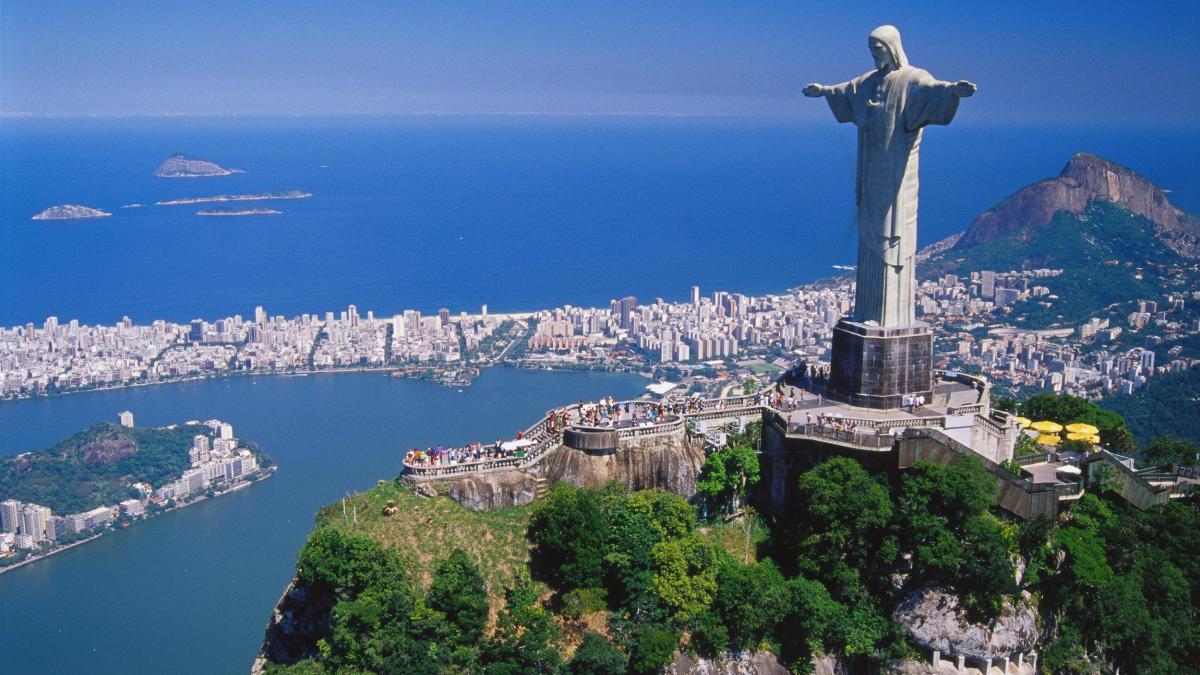
Rio generates over 10% of Brazil’s Travel & Tourism sector, but needs to work harder to attract international visitors
Travel & Tourism contributed US$6.5bn to GDP in Rio de Janeiro in 2016, 4.9% of the city’s economy, and representing 11.5% of Brazil’s Travel & Tourism sector. However, less than 6% of tourism spend in the city comes from the international market, revealed a new report by the World Travel & Tourism Council (WTTC).
Latin America City Travel & Tourism Impact is one of a series of reports by WTTC which looks at the contribution of Travel & Tourism to city economies and job creation. The study covers 65 cities, six of which are in Latin America.
The data suggests that hosting the World Cup in 2014 and the Olympics in 2016 had limited direct impact on overall Travel & Tourism GDP and employment in the city. In 2014, there was a small increase in the volume of visits and overnight nights stays however this level has not been maintained; and in 2016, as often seen after mega-events, there was a significant displacement to other destinations, with other travel postponed or deferred. Improvements in international demand were also offset by lower domestic demand due to the recession.
Less than 4% of Brasília´s Travel & Tourism activity was generated by international demand, as Brazil´s capital city relies on domestic spending. Business travel is important for the city, including large volumes of government related-travel. Growth has slowed more recently during the recession, but this follows some particularly strong growth in prior years as economic activity was booming, helped by increases in government spend.
Brasília´s tourism GDP is only 3.2% of the city´s economy, accounting for US$2.1bn. The sector generates 52,600 jobs in the city, or 3.9% of its employment.
The total contribution of Travel & Tourism to Brazil´s GDP was BRL530.5bn (US$152.2bn), 8.5% of GDP in 2016. The total contribution of the sector to employment, including jobs indirectly supported by the industry was 7.8% of total employment (7 million jobs). Over the next ten years, there will be 9 million jobs in Brazil through tourism activity.
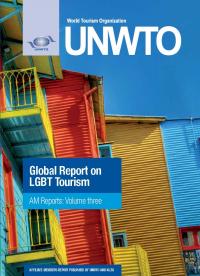
Should laws be on the books that harm tourism and are not enforced?
SATW’s Board of Directors decided to accept Barbados’ bid to host our 2018 convention has raised some concerns among the membership, specifically that there is law in Barbados that makes the island appear unwelcoming to the gay and lesbian community.

The law against sodomy has not been enforced for years. More than 70 other countries have similar laws, and the same laws remain on the books in 12 states in the US. There is even a sodomy law in Canada that has not been officially removed from the books.
Visitors – straight and LGBT – do not face any danger or prejudicial treatment in Barbados beyond what one might encounter from individuals in any country who harbor prejudicial tendencies. Barbados, like many places in the region, is moving forward on human rights issues, and the Board believes Barbados is a friendly, welcoming and story-rich island.
-Kenita Placide, Director of the Eastern Caribbean Alliance for Diversity and Equality (ECADE) and Caribbean Advisor for OutRight Action International
The island’s LGBT community, while small, is not invisible. This month, Barbados will hold its second-ever Pride weekend. The launch reception on November 24 will be held by the High Commission of Canada, and events through the weekend include a beach day, movie night, business and services expo, talent show, and more. The island is home to two LGBT rights organizations, B-GLAD and Equals, Inc.
-René Holder-McClean-Ramirez, Co-Director, Equals, Inc.
SATW has been a safe and inclusive organization for all walks of life – regardless of gender, ethnicity, race, LGBT, etc. – and will continue to be so. We also understand and respect the objections raised by some members. But we are an association of travel professionals who journey around the world and write the truth about what we see. SATW members can be agents of change, able to go to troubled places, and tell our audience what we find there.
“IGLTA advocates respect and dignity for all. We do not support destination boycotts and make every effort to build bridges, not walls. We believe that tourism is a force for good that transcends oppression and promotes understanding.”
-John Tanzella, President/CEO, International Gay Lesbian Travel Alliance (IGLTA)
Embargoing an entire island or country hurts everyone, not just the purveyors of prejudice. While the Board is listening, respecting and responding to the concerns of our members, there is much that we can do, as a society, to encourage gender rights and freedoms on the island: a forum of local LGBT journalists? a presentation on the positive impact of LGBT travel? We are open to the conversation and to suggestions of how we can use our considerable influence on the ground.
Finally, one of the reasons Barbados is hosting SATW is the belief that our members will bring positive attention to the Caribbean as a whole, a tourism-dependent region that has been hard-hit by this year’s storms. Barbados was not impacted by the storms – the island lies outside the traditional hurricane belt. But while some islands will recover in time for this year’s “high season,” others will need many months to rebuild. Our presence will help tell the story of rebuilt communities that have suffered so much.
We can achieve so much more with our presence than we can with our absence.
Sincerely,
Barbara Ramsay Orr
SATW President
David Swanson
SATW President-Elect
Catharine Hamm
SATW Immediate Past Presiden
SATW Member Bea Broda came to an interesting conclusion:
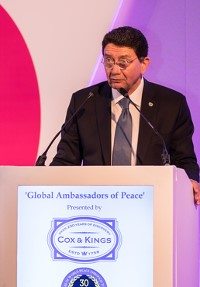
Tourism industry leaders honored as IIPT Ambassadors of Peace
The International Institute for Peace through Tourism honored 7 outstanding people from the world of travel & tourism as “Global Ambassadors of Peace through Tourism” at World Travel Market (WTM), London this past week. Dr. Taleb Rifai, Secretary General of UNWTO, was conferred with the IIPT lifetime achievement award as a “Global Man of Peace.” Theme of the awards event was “Tourism – A Catalyst for Peace”, featuring Dr. Rifai as the Keynote Speaker and Anita Mendiata the Master of Ceremony.
Supported by “Incredible India” and the UNWTO, this first edition of the Awards was sponsored by Cox & Kings and TravelBiz Monitor the Media partner for the awards.
In his Keynote address, Dr. Taleb Rifai, Secretary General of UNWTO said that for the 7th consecutive year, the growth in tourism had exceeded growth in other sectors. However, he said, tourism is far more than numbers and statistics; to travel is a basic human right. Quoting Mark Twain he said “Travel is fatal to prejudice, bigotry and narrow mindedness…” The 1.8 billion tourists expected to travel the world by 2030 could be 1.8 billion opportunities, or 1.8 billion disasters – the choice, he said, is ours. There is no conflict between growth and sustainability, he said, because sustainability is beyond “Going Green” it’s about sustaining life on Earth. “As I come to the end of my journey as Secretary General,” he said “the thought I would like to leave with is ‘Whatever you do, do it to make the world a better place.’”
D’Amore, Founder President, IIPT, said, “IIPT is privileged and grateful to pay tribute to Dr. Taleb Rifai for his global leadership these past eight years. We have been most honored to have Dr. Rifai grace the stage at IIPT WTM events as our featured keynote speaker over the past several years – and to have his unwavering support for IIPT initiatives in our mission to make the travel and tourism industry – the world’s first global peace industry. We look forward to a continuing relationship with him in the years ahead as we join hands in efforts to promote the transformative role of tourism in “making the world a better place.’”
Ajay Prakash President, IIPT India, said, “As the UN International Year of Sustainable Tourism for Development draws to a close, it’s important to accept that the work is far from complete and that we need to carry the impetus forward into the years ahead. While it’s axiomatic that peace is vital to the promotion of tourism, it is important to reiterate that tourism can be a vital force for the propagation of peace and this can happen only if the concept of Peace through Tourism forms part of the core business philosophy of the tourism industry.” Commenting on the rationale of the Awards, Prakash continued, “Because tourism is so people centric it is important to recognize and honor exceptional persons in the field who can serve as role models and inspire others to carry the baton.”
Commenting on the awards, Peter Kerkar, Group CEO, Cox & Kings, says, “Cox & Kings is extremely proud to be sponsoring the ‘Global Ambassadors of Peace Through Tourism’ Awards and honoring those individuals who have devoted time and energy to promoting goodwill through travel. It is vital that we encourage peaceful cultural exchange and recognise those who have used tourism to facilitate philanthropic activities. These ideals are no better represented than by the IIPT and our ‘Global Man of Peace,’ Dr. Taleb Rifai, Secretary General of the UNWTO.”
Each one of the chosen Ambassadors has had an illustrious and successful career in tourism and each, through their lives and work, embodies the founding principles of IIPT. Louis D’Amore, Founder President of IIPT recounted the long association that each one of the Award winners had had with IIPT. Each of the Ambassadors was an exceptional person, he affirmed, and IIPT was proud to honour them. Going forward, he said, the IIPT Global Peace Parks project, the association with Flanders to mark the Centenary of the end of the 1st World War under the banner “No More War” and the “Travel for Peace” campaign would be the focus of IIPT in its 30th Anniversary year leading up to the UNWTO – IIPT Global Summit in Montreal, August 2018.
Helen Marano, Director Government & Industry Affairs WTTC referred to the recent seminal study by WTTC on Tourism as A Driver of Peace which, based on data collected over 8 years, established the first empirical relationship between tourism and peace correlating the parameters of the Global Peace Index and the Tourism Index.
Mr. Jay Kumar Rawal, Tourism Minister of Maharashtra commended IIPT on the work it was doing to recognize global icons of Tourism for Peace and Sustainability. He went on to explain the Indian concept of “Vasudhaiva Kutumbakam” which essentially means “The World is One Family” and referred to the recent Government of India initiative to hold a “Paryatan Parv,” a celebration of tourism for 20 days in October to bring people together.
Founded in 1986 by Louis D’Amore, IIPT is built on two very simple but powerful premises: That tourism, one of the world’s largest industries, can become the world’s first global Peace Industry and support the belief that every traveler is potentially an Ambassador for Peace. Through global summits, conferences, the global Peace Parks initiative, Travel for Peace Campaign consultations with governments and the UNWTO and a regular monthly newsletter, IIPT has worked conscientiously over the last 30 years to make peace an integral part of the tourism ecosphere.
IIPT plans to make the “Ambassadors of Peace Through Tourism” awards an annual feature at WTM London.
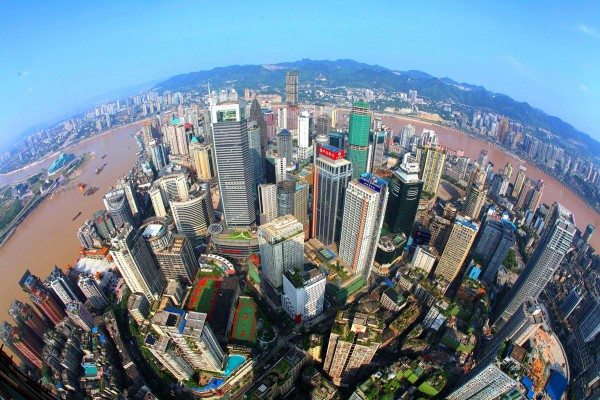
World Travel & Tourism Council: Top 10 fastest growing tourism cities are all in Asia
The World Travel & Tourism Council (WTTC) has launched the new city tourism impact data, which shows that the world’s top ten fastest growing tourism cities are all in Asia. Asia Pacific City Travel & Tourism Impact is one of a series of reports by WTTC, which looks at the contribution of Travel & Tourism to city economies and job creation. The study covers 65 cities, 21 of which are in Asia Pacific. The data shows that Asian cities are at the forefront of tourism growth over the next ten years.
Chongqing (14% growth per year) heads the table, followed by Guangzhou (13.1%), Shanghai (12.8%) and Beijing (12%). The other cities on the top ten list are Chengdu (11.2%), Manila (10.9%), Delhi (10.8%), Shenzhen (10.7%), Kuala Lumpur (10.1%) and Jakarta (10%). With the world average growth rate at 4% per year, and Asia Pacific at 5.8%, these cities are significantly outpacing both the regional and global average. Asia Pacific also includes some of the world’s largest Travel & Tourism cities. Shanghai, with an annual tourism GDP contribution of US$30 billion is the largest in the world; followed by Beijing (US$29 billion). Tokyo (US$20 billion) is ranked 6th in the world.
Shanghai and Beijing together account for 21% of China’s Travel & Tourism economic impact (GDP), whereas Tokyo alone accounts for 18% of Japan’s total. The dominance of the Chinese market is clear, both in terms of future growth and overall size and as a main source market for destinations in the wider Asia Pacific region. The success of Chinese cities is largely driven by domestic business (as high as 94.5% of spend in Chongqing is domestic), and the Chinese outbound market is key for neighboring cities such as Tokyo (24% of spend is Chinese, the largest market) and Bangkok (38%).
Gloria Guevara, President & CEO, WTTC said “The power of Asian cities when it comes to driving the Travel & Tourism sector is clear to see in this new data. However, not only do these cities contribute significantly to their country’s tourism sector, tourism is an important generator of economic growth and jobs within the cities themselves. With this level of forecast growth, the importance of investment in long term planning, infrastructure and sustainable public policies cannot be underestimated. It is vital that city authorities understand the economic impact of Travel & Tourism, GDP and employment contribution, and not just visitor arrivals, as they seek to develop new products and opportunities to increase traveler spend and sustainable growth.
WTTC has invested in this new research and data to support them in this ambition. Other highlights from the report include: Singapore’s Travel & Tourism has doubled in the past ten years, to a total of US$12.4 billion in 2016 and supporting 164,000 jobs. Tourism in Bangkok generates US$18.2 billion for the city each year, representing 10% of the city’s economy and 50% of Thailand’s Travel & Tourism. Delhi and Mumbai together generate over 1 million tourism jobs, 10% of India’s total tourism employment. Macau is the most tourism intensive city in Asia Pacific with 27% of its economy a direct result of tourism spend. Eight cities in the study contribute more than 25% of their country’s Travel & Tourism economy: Auckland, Bangkok, Ho Chi Minh City, Jakarta, Kuala Lumpur, Manila, Seoul and Sydney.
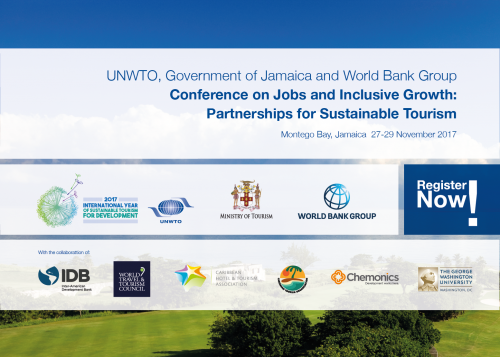
Jamaica conference to address the role of tourism in employment creation and inclusive growth
UNWTO, the Government of Jamaica, the World Bank Group and the Inter-American Development Bank will co-host a Conference on Jobs and Inclusive Growth on 27-29 November in Montego Bay, Jamaica. Under the theme ‘Partnerships for Sustainable Tourism’, the event will assess and discuss the future of the sector in the Caribbean, particularly in view of the impacts of natural disasters such as the recent hurricane Irma.
The summit aims at identifying successful models and future initiatives of public-private partnerships (PPPs) that will contribute to sustainable tourism development globally. It will also serve as a platform for leaders from the tourism sector, along with governments, donors and development and finance organizations, to put in place an international road map to promote inclusive economic and social development through tourism.
The Conference will commence with an introductory session on the future of tourism in the Caribbean region.
“Tourism has the potential to contribute to all 17 Sustainable Development Goals, yet we can only achieve our common objectives if we build strong partnerships. The Jamaica Conference will be a milestone in setting a new framework for collaboration in the promotion of sustainable tourism and an important legacy of the International Year of Sustainable Tourism for Development 2017” said UNWTO Secretary General Taleb Rifai.
Over 100 speakers will share their experience and knowledge during the three-day event.
The first day will cover themes such as:
– Tourism and Sustainability – Threats, Risks, Opportunities and Challenges
– Current Trends in Indigenous Tourism
– Talent Development and Human Capital Trends
– Community Tourism
– Tourism Networks: Creating Linkages, Reducing Leakages
– Science, Technology and Innovation in Tourism and
– Caribbean Tourism
On the second day, plenary sessions will guide the discussions. The first will focus on ‘Collaborating for Success – Public/Private Engagement Mechanisms for Tourism Development and Growth’, where ministers and CEOs will share their experiences on the keys, pitfalls and myths to successful collaboration between the public and private sector on tourism development. Collaboration and partnership models in such areas as infrastructure, development finance, large-scale asset management and service delivery will be addressed extensively.
The second round table will serve to facilitate exchanges by sector leaders on the emerging trends and predicted key drivers of destination development over the next ten years. Emphasis will be placed on how sustainable tourism partnerships can contribute to job creation, connectivity and inclusive growth.
The last day of the conference will look into the issues of:
– Technical Assistance and Financing,
– Donor Funded Programs that Balance Scale, Sustainability and Inclusion,
– Successful Models of Destination Management;
– Education, Training & Innovation and
– Cozumel – Partnerships in Action.
The Conference is organized by the World Tourism Organization (UNWTO), the Ministry of Tourism of Jamaica, the World Bank Group and the Inter-American Development Bank, in collaboration with the World Travel and Tourism Council (WTTC), the Caribbean Hotel and Tourism Association, the Caribbean Tourism Organization, Chemonics International and the George Washington University.

UNWTO: International tourism on track for a record year
Demand for international tourism remained strong during the Northern Hemisphere summer peak season. International tourist arrivals in July and August totalled over 300 million for the first time ever according to the latest UNWTO World Tourism Barometer. Many destinations reported double-digit growth, in particular in the Mediterranean.
Between January and August 2017, destinations worldwide welcomed 901 million international tourist arrivals (overnight visitors), 56 million more than in the same period of 2016. This corresponds to a robust 7% increase, well above the growth of previous years. With upbeat prospects for the remaining months of the year, 2017 is set to be the eighth consecutive year of continued solid growth for international tourism.
Results reflect the sustained growth in many destinations combined with the recovery of those suffering from security challenges in recent years.
By UNWTO regions, growth was strongest in Africa (+9%) and Europe (+8%), followed by Asia and the Pacific (+6%), the Middle East (+5%) and the Americas (+3%).
This strong performance is confirmed by experts from around the world surveyed for the UNWTO Confidence Index, who evaluated the May-August period very positively. Prospects for the last four months of 2017 remain also buoyant according to the experts consulted.
“Tourism is a major economic engine and employment generator, contributing to the improvement of livelihoods of millions of people around the world” stated UNWTO Secretary-General Taleb Rifai in London, ahead of the World Travel Market.
“As we draw to the end of the International Year of Sustainable Tourism for Development, we must reflect on how to manage tourism in a responsible and sustainable way beyond 2017. Maximizing the social and economic benefits of tourism while minimizing any negative impacts on host communities and the environment should remain at the forefront of our efforts in the years to come, with policy-makers, companies and travelers all contributing to this shared objective,” Mr. Rifai added.
Regional Results
In Europe (+8%), international arrivals rebounded in both Southern and Mediterranean Europe (+12%) and Western Europe (+7%) following a weak 2016. Arrivals grew by 6% in Northern Europe and by 4% in Central and Eastern Europe between January and August 2017.
Africa (+9%) recorded the fastest growth of all five regions, thanks to the strong rebound in North Africa (+15%) and the sound results of Sub-Saharan Africa (+5%).
South Asia (+10%) led growth in Asia and the Pacific (+6%), followed by South-East Asia (+8%) and Oceania (+7%), while results in North-East Asia (+3%) were rather mixed.
Most destinations in the Americas (+3%) continued to enjoy positive results, led by South America (+7%), followed by Central America and the Caribbean (both +4%). In North America (+2%), robust results in Mexico and Canada contrast with a decrease in the United States, the region’s largest destination.
Results in the Middle East (5%) are mixed, with some destinations strongly rebounding from negative growth in previous years, while others reported declines through August.
Strong outbound demand from major source markets, rebound from Russia and Brazil
Inbound visitor growth across world destinations was fuelled by strong outbound demand from the majority of source markets.
Among the top 10 markets, international tourism expenditure grew fastest in China (+19%), the Republic of Korea (+12%), the United States (+8%) and Canada (+7%). Expenditure from Germany, the United Kingdom, Australia, Italy and Hong Kong (China) grew between 3% and 5%, while France reported a modest 1% increase.
Worth noting beyond the top 10 source markets is the significant recovery in demand from the Russian Federation (+27%) and Brazil (+35%) after a few years of declines in tourism expenditure abroad.
